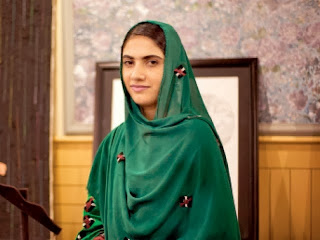Chandan Syed
The narrative of the vast and unwieldy Balochistan is largely tendentious; those beyond the peripheries of the province can barely imagine the daily grind of life in Quetta or its precarious neighborhoods, for lack of access or opportunity for outreach.
A modest group of Baloch students exhibited not just the talent and compassion of the province’s youth but also its ambition to fight a landscape of terror and invisibility with the hope of rousing change.
Chandan Syed, a 21-year-old fine arts student at Balochistan University, was one of three young women engaged in a workshop and subsequent forum facilitated by Insan Foundation Trust (IFT). The project aimed at using media and art as a tool to promote the rights of women and minorities.
Chandan defies all stereotypes, wearing a confident smile and posing for pictures in front of her painting of a woman being pulled by strings.
“I have had tremendous support from my family to pursue what I want, but this is not true for most women around me,” she explains that while her home-town is a lot more nuanced than it is portrayed as in the media, it remains a difficult terrain for women.
Howra Batool’s installation is the perfect illustration of this: a woman in a black burqa is crouched between garbage bags, blending into nonexistence. For the 20-year-old artist who belongs to a minority sect, women who wish to be elastic and to grow out of their traditional roles are stilted because of the prevalence of family honour and ‘pardah’.
“Our lives are marked with uncertainty,” Howra, who has to take two rickshaws to reach the university, where she is in the first year of the fine arts programme, expresses her ambivalence at the lack of opportunity within the province. “The university has been shut for the last month because of strikes and the unavailability of transport so I just paint in my basement.”
Muhammad Sadiq, who is finishing off a degree in journalism, views the platform as a kind of mirror, to reflect all that is good, bad, true and false within a landscape that he intrinsically loves but wishes to progress. As an intern at a local news station, Sadiq describes the challenges of working within fearful circumstances.
“Every article is met with threats and for every assignment I go to cover, my family is holding their breath,” explained the vivacious 24-year-old, who feels that the media at large has little stake in the region, and is by force of circumstance unable to portray a wholesome picture.
Around 40 students from Peshawar University, Karachi University, Lahore College for Women University, and Islamia University Bahawalpur participated in the forum and were trained earlier this year to use media and art as an expression for gender, religious and ethnic equality.
According to ITF Dirctor Kishwar Sultana, respect, equality and peaceful coexistence without any discrimination on the basis of gender, class and creed are at the forefront of youth education and must be included as part of their development and expanding sensibilities.
“Our students are very talented but rarely have the opportunity to broaden their horizon and be encouraged outside of their immediate environs,” expressed Ambreen Hassan, a faculty member at the Balochistan University.
< Express Tribune >



No comments:
Post a Comment